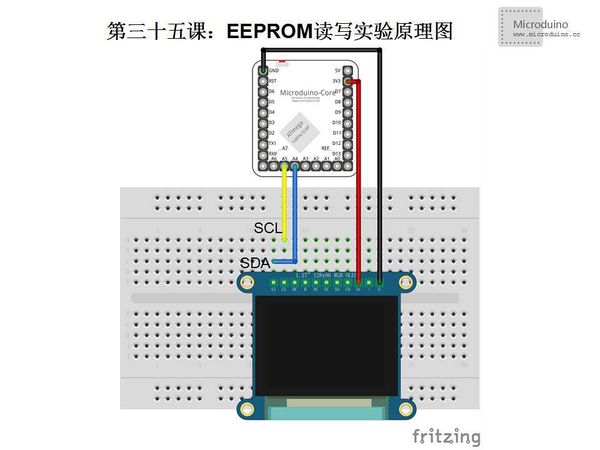Lesson 35--Microduino EEPROM Reading and Writing Experiment
| Language: | English • 中文 |
|---|
Contents[hide]ObjectiveThis tutorial will teach you how to use EEPROM, the value stored in the EEPROM will be displayed on the Microduino-OLED module. Equipment
EEPROM introduction EEPROM (E2PROM - Electrically-Erasable Programmable Read-Only Memory) is a kind of semiconductor storage device which can electronically autotype for many times. Microduino control chip has EEPROM, it is used widely in more area. After power off need to save the information tjat can be stored here. Such as electronic password safe. SchematicProgram#include <avr/eeprom.h>
#include "U8glib.h"
#define EEPROM_write(address, var) eeprom_write_block((const void *)&(var), (void *)(address), sizeof(var))
#define EEPROM_read(address, var) eeprom_read_block((void *)&(var), (const void *)(address), sizeof(var))
U8GLIB_SSD1306_128X64 u8g(U8G_I2C_OPT_NONE);//Define OLED connection method
//Define a config_type structure contains a int variable
struct config_type
{
int num;
};
void draw() {
// 1) Define structure variable config and set the initial value
config_type config;
config.num = random(3000);//Select a random number in 0~3000
// 2) Store the config to EEPROM, from the address 0 to write
EEPROM_write(0, config);
// 3) Read the value from address 0, then stored into config_readback
config_type config_readback;
EEPROM_read(0, config_readback);
u8g.setFont(u8g_font_unifont);//font 1
u8g.drawStr( 0, 16, "Num:");
u8g.setFont(u8g_font_7x13);//font 2
u8g.setPrintPos(0, 32);
u8g.print(config_readback.num);
}
void setup()
{
}
void loop()
{
u8g.firstPage();
do {
draw();
}
while( u8g.nextPage() );
delay(2000);//Delay 2s
}Function description: EEPROMwrite(addr,data) writes the data to specific address. Addr is that write address, data is the written data. EEPROM_read(addr,data) read the data from specific address. Addr is that read address, data is the read data. random(num) uses to generate random number, the num is the range for random number. DebugStep 1: Copy the code to IDE and compile it Step 2: Run program Step 3: Observe Microduino-OLED
ResultMicroduino-OLED will display the value of EEPROM, change the number every 2s. Video |

